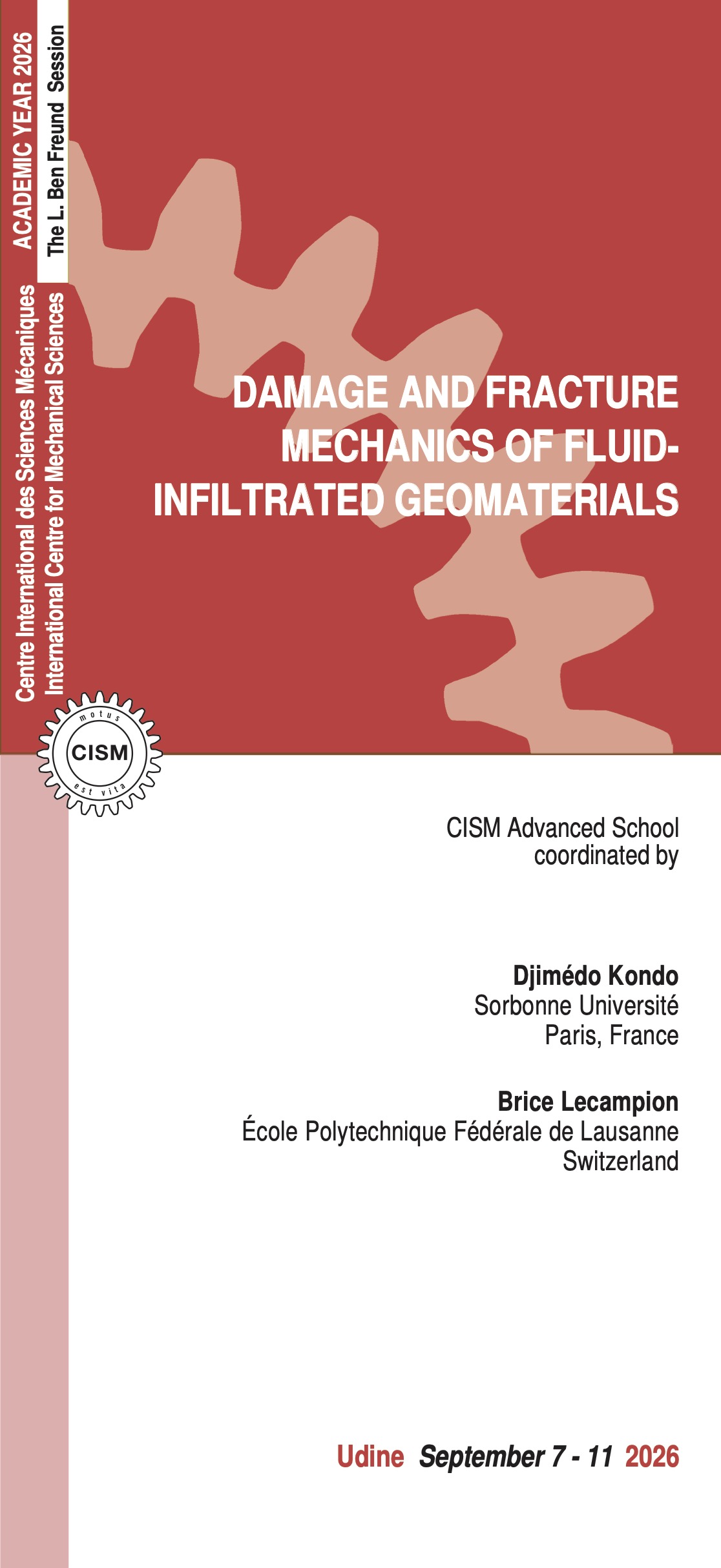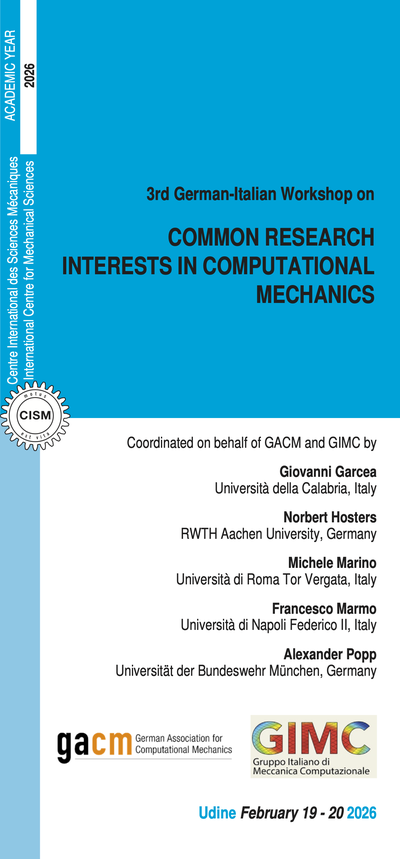Quasi-brittle fractures appear across multiple scales in geomaterials – from a few microns to kilometric faults. For all engineering applications in the upper crust, the quantification of how fractures initiate, grow, and interact across scales is paramount to i) assess the ultimate failure of man-made structures (such as tunnels & dams, among others), and ii) control hydraulic pathways in the underground.
The mechanics of damage and fracture in fluid-infiltrated geomaterials provide the necessary tools to address a wide range of important problems, from the sealing properties of radioactive waste repositories to the hydraulic stimulation of pre-existing fractures in deep geothermal reservoirs, and the risks of fault reactivation in CO2 geological storage. Geomaterials are inherently heterogeneous and always include preexisting (micro- and macro-) discontinuities. Moreover, their mechanical behavior is frictional: it strongly depends on the mean stress. The mechanics of fracture and damage in geomaterials is, therefore, inherently more complex than in other materials, not to mention the strong coupling between fractures and fluid flow.
This one-week school aims to provide a complete review of the theoretical foundations and modern experimental and numerical techniques to address the quasi-brittle failure of geomaterials at multiple scales. The course will discuss experimental and field-scale observations to introduce essential mechanisms necessary to understand damage and fracture in fluid-saturated porous media. The lectures will then present in detail the thermodynamics of non-local damage, plasticity and fracture of fluid-infiltrated porous solids, analytical micro-mechanical approaches. Semi-analytical solutions for fluid-driven rupture growth and their use to analyze experiments and large-scale observations will be presented.
Complex geometries and non-linearities require numerical modeling. The course will thus present traditional and novel numerical methods for damage and fracture and their couplings with fluid flow. Notably, finite element methods and their extension to non-local damage and phase-field models will be thoroughly presented. How to account for the effect of randomness and heterogeneity in these materials will be the focus of lectures introducing novel techniques on these issues. Special attention will be made to the importance of advanced experimental techniques at different scales to guide the development of quantitative models. Examples of novel imaging techniques on different experimental setups will be presented in several lectures.
Applications of the theory to relevant problems encountered in radioactive waste storage, hydraulic stimulation of deep reservoirs, natural hazards, gas storage but also in the fracture of soft matter (e.g. hydrogels).
Two brainstorming sessions will be held on day 3 and day 4, aiming at fostering discussion on emerging research topics in the field in relation to:
1) The links between advanced imaging techniques and constitutive modeling;
2) Model complexity vs predictability in practice.
The course is addressed to doctoral students, young & senior researchers, and practicing engineers.
Dormieux, L., Kondo, D. & Ulm, F-J. (2006) Microporomechanics. Wiley.
Zhang XD., Cheng L., Kondo D., Giraud A. (2024). Incremental variational approach to poroelasticity of saturated media. J. Mech. Phys. Solids 187 105614.
Li, S., & Wanga, G. (2008). Introduction to micromechanics and nanomechanics. World Scientific.
Arson, C. (2020). Micro-macro mechanics of damage and healing in rocks. Open Geomechanics, 2, 1-41.
You, T. and Yoshioka, K., (2023). On poroelastic strain energy degradation in the variational phase-field models for hydraulic fracture. Computer Methods in Applied Mechanics and Engineering, 416, p.116305.
Yoshioka, K., Mollaali, M. and Kolditz, O., (2021). Variational phase-field fracture modeling with interfaces. Computer Methods in Applied Mechanics and Engineering, 384, p.113951.
Viggiani G., Tengattini A. (2019) – Recent developments in laboratory testing of geomaterials with emphasis on imaging. Keynote Lecture, Proceedings of the XVII ECSMGE – Geotechnical Engineering foundation of the future, ISBN 978-9935-9436-1-3.
Tengattini A., Andò E., Lenoir N., Viggiani G. (2021) – Neutron imaging for geomechanics: a review. Geomechanics for Energy and the Environment, 27, 100206.
J. Eliáš and G. Cusatis (2022) - Homogenization of discrete mesoscale model of concrete for coupled mass transport and mechanics by asymptotic expansion. Journal of the Mechanics and Physics of Solids 167, 105010.
J.E. Bolander, J. Eliáš, G. Cusatis and Kohei Nagai (2021) Discrete mechanical models of concrete fracture. Engineering Fracture Mechanics 257, 108030.
D. Liu and B. Lecampion. Laboratory investigation of hydraulic fracture growth in Zimbabwe gabbro. Journal of Geophysical Research: Solid Earth, 127(11):e2022JB025678, 2022.
C. Peruzzo, A. Möri, and B. Lecampion. The energy balance of a hydraulic fracture at depth. International Journal of Engineering Science, 205:104151, December 2024.
6 lectures on:
Micro-mechanics of damage and healing in polycrystalline rocks, numerical methods to couple continuum damage and discrete fractures, surrogate models with deep learning, applications in energy geomechanics.
5 lectures on:
Modelling of fracture at multiple scales, coupled saturated system of mechanics and transport formulated in discrete mesoscale framework, computational homogenization of coupled discrete models, effect of randomness in material description (statistical size effect, Weibull theory, Monte Carlo integration technique).
5 lectures on:
Thermodynamics of fluid-infiltrated porous media, including non-local damage, micromechanics of saturated porous media, variational approach of coupled thermo-poroelasticity, ductile failure modeling.
5 lectures on:
Laboratory experiments of fluid-driven fractures in geomaterials, combined active and passive acoustic monitoring of fracture and damage growth in geomaterials, and modeling of fluid-driven fracture growth in quasi-brittle & heterogeneous porous solids.
5 lectures on:
The experimental investigation of damage, strain localization and fracture in geomaterials, with a particular focus on advanced experimental techniques such as X-ray and neutron imaging.
5 lectures on:
Phase-field models of fracture in saturated and unsaturated porous media, numerical approaches for hydro-mechanical coupled phase field models, including applications and case studies.
ADMISSION AND ACCOMMODATION
The course is offered in a hybrid format, allowing participants the flexibility to attend either in person or remotely via the Microsoft Teams platform. Admission to on-site attendance is granted on a first-come, first-served basis to comply with the capacity of the lecture room.
Registration fees:
- Early Bird On-Site Participation: € 650.00 + VAT* - Deadline: July 7, 2026
- Late On-Site Participation: € 800.00 + VAT* - Deadline: August 26, 2026
- Live Streaming Online Participation: € 250.00 + VAT* - Deadline: August 26, 2026
On-site participation includes a complimentary bag, five fixed menu buffet lunches, hot beverages, downloadable lecture notes.
Online participation includes downloadable lecture notes.
Application forms should be submitted online through the website: http://www.cism.it. A confirmation message will be sent to participants whose applications are accepted.
Upon request, and subject to availability, a limited number of on-site participants can be accommodated at the CISM Guest House for € 35 per person per night. To request accommodation, please contact foresteria@cism.it.
CANCELLATION POLICY
Applicants may cancel their registration and receive a full refund by notifying the CISM Secretariat in writing (via email) no later than:
- July 7, 2026, for early bird on-site participation;
- August 7, 2026, for late on-site participation;
- August 26, 2026, for online participation.
No refunds after the deadlines. Cancellation requests received before these deadlines and incorrect payments will be subject to a € 50.00 handling fee.
GRANTS
A limited number of participants from universities and research centers who do not receive support from their institutions can request a waiver of the registration fee and/or free lodging.
Requests should be submitted by email to the CISM Secretariat at info@cism.it by July 7, 2026. Submissions must include the applicant’s curriculum vitae and a letter of recommendation from the head of the department or a supervisor, confirming that the institute is unable to provide funding. Preference will be given to applicants from countries that sponsor CISM.





